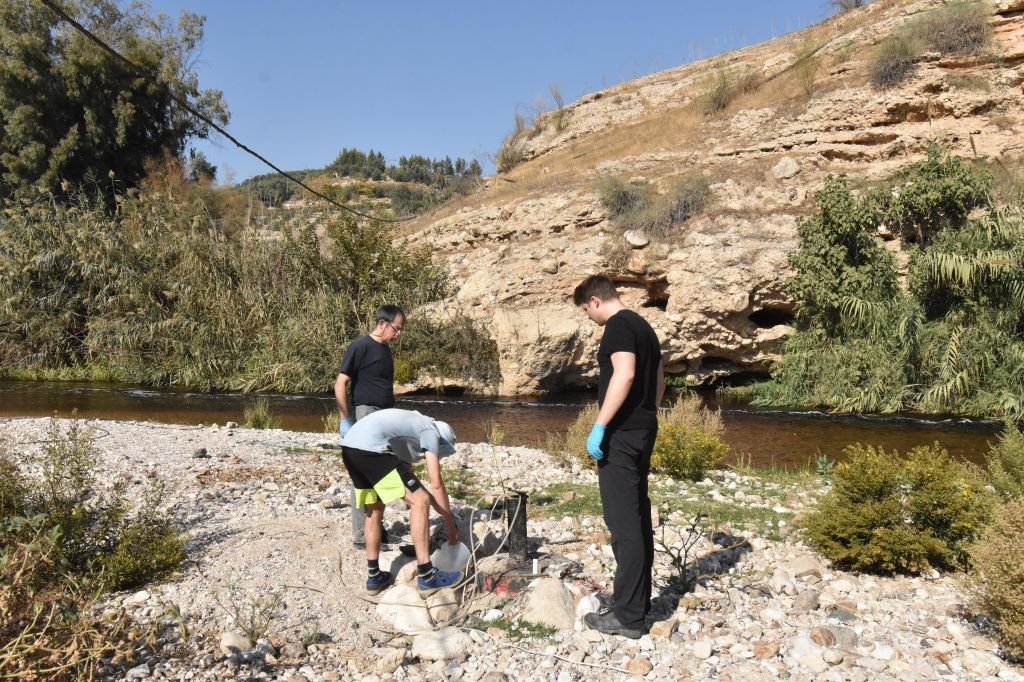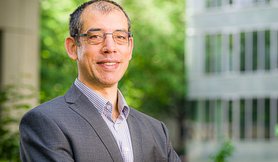
Research and training cooperation for sustainable water management with the MENA region enters its fifth year
Water resources in the Middle East and North Africa (MENA) are increasingly under threat - a sustainable solution is more urgent than ever. Together with international partners, the Dresden University of Applied Sciences (HTW Dresden) is focussing on innovative approaches in the field of water management.
INNOVATIVE APPROACHES TO GROUNDWATER RECHARGE AND INTERNATIONAL COOPERATION
The Middle East and North Africa (MENA) are among the most water-scarce regions in the world. The aim is to achieve sustainable management of scarce water resources. The Department of Water Management at the Dresden University of Applied Sciences (HTW Dresden/HTWD) and other German and MENA partners are working on research and implementation activities for groundwater recharge using the Managed Aquifer Recharge (MAR) process. MAR comprises various techniques, including the application of the natural purification process of bank filtration (UF), also known as riverbank filtration. Teaching and research staff at universities and other institutions in the MENA region are being trained for this purpose.
Under the coordination of the HTWD, these activities will take place from 2021 as part of two projects: FEMAR, funded as part of the ‘Middle East Regional Water Research Cooperation Programme’ (MEWAC) of the Federal Ministry of Education and Research (2021-2024) and MENAWAT, funded as part of the ‘Ta'ziz Scientific Cooperation’ (2023-2025) of the German Academic Exchange Service (DAAD) with funds from the Federal Foreign Office.
The results of the FEMAR project were presented to representatives from science, international organisations, authorities and farmers at the ‘Symposium on MAR in the Middle East’ in Amman on 19 November 2024. Studies by the American University of Beirut (AUB, Groundwater Hydrology Group) in the upper Litani River Valley in Lebanon have shown that it is technically feasible to store excess spring water in the aquifer in winter for use in the dry season. In Syria, the University of Aleppo (UAS, Department of Field Crops) recommends pre-treatment of the Quaiq river water for irrigation in order to increase crop yields, improve fodder quality and reduce soil pollution.
Studies by the Institute of Groundwater Management at the Technical University of Dresden (TUD) in collaboration with Lebanese and Syrian partners on numerical groundwater flow modelling have improved the hydrogeological understanding of their study areas. TUD developed an automated, generalisable and scalable multi-model framework based on open-source tools to model complex hydrogeological conditions such as karst systems. In the FEMAR project, joint research work was carried out by the Royal Scientific Society (RSS, Emerging Pollutants Research Group), HTWD and Umweltbüro GmbH Vogtland (UBV, Weischlitz) on a constructed bank filtration measurement profile on the heavily polluted Zarqa River in Jordan. It was shown that the use of bank filtration can provide water for irrigation even in shallow fluvial aquifers and that the risk to plants and the food chain from waterborne pathogens and organic trace substances can be significantly reduced.
The MENAWAT project is expanding educational and research cooperation in the field of MAR and UF with universities and non-university institutions in Jordan and Morocco. To expand the skills of engineering students, engineering and entrepreneurial aspects with regional relevance were discussed at the MENAWAT workshop ‘German-Jordanian Interdisciplinary Workshop on Higher Education in Natural Resources Management & Entrepreneurship’ on 3 July 2024 in Dresden. A delegation from the School of Natural Resources Engineering and Management (SNREM) at the German Jordanian University (GJU) took part in this workshop. The workshop also included contributions from the Faculties of Economics (Professors R. Baierl and R. Thamm) and Agriculture/Environment/Chemistry (Dr G. Lux). Ms K. Tomecko presented the DAAD-funded project ‘Intercultural Co-Creation for International Entrepreneurship Education’, which deals with the need to innovatively design entrepreneurial education in different cultural contexts and to combine intercultural competences with entrepreneurial skills in students. Dr Lux organised an interesting excursion to the Agri-Photovoltaic Test Site of the Faculty of Agriculture.
27 people, including 16 Bachelor's and Master's students and doctoral candidates from Jordan, Tunisia and Germany, took part in the ‘Managed Aquifer Recharge Autumn School’ in Amman on 20 and 21 November 2024. The Autumn School was organised by SNREM and HTWD as a further training measure as part of the MENAWAT project. Experts from TUD and UBV (Germany), Yarmouk University (Jordan), the Tunisian Ecole Nationale d'Ingénieurs in Sfax, GJU and HTWD covered topics such as hydraulics, water quality, numerical groundwater modelling, well construction as well as site investigation, monitoring and assessment methods including the application of remote sensing methods.
The autumn school concluded with practical field work on 22 November, during which the participants recorded water levels and water quality parameters and took water and soil samples from a UF measurement profile on the Zarqa River. The next summer school on MAR will be organised by the HTWD in Dresden in August/September 2025. The projects with the MENA partners are in line with the HTWD's internationalisation strategy. The collaboration was only possible thanks to the support of the Central Project Administration (ZPA) in the HTWD's Vice-Rectorate for Research, Sustainability and Technology Transfer.
The projects with the MENA partners are in line with HTWD's internationalisation strategy. On the one hand, the cooperation was only possible thanks to the support of the Central Project Administration (ZPA) in the Vice-Rectorate for Research, Sustainability and Technology Transfer at HTWD; on the other hand, the ZPA has gained valuable experience in managing international projects outside the European Economic Area.
Contact



![[Translate to English:] [Translate to English:] m](/fileadmin/_processed_/b/1/csm_02_MENAWAT_WKSP_3July_Pillnitz_5743c79f85.jpg)
![[Translate to English:] [Translate to English:] m](/fileadmin/_processed_/4/9/csm_04_MENAWAT_MAR_School_21Nov_GJU_1edefb2356.jpg)
![[Translate to English:] [Translate to English:] m](/fileadmin/_processed_/5/c/csm_03_MENAWAT_WKSP_3July_HTWD_3e122ba2f1.jpg)
![[Translate to English:] [Translate to English:] m](/fileadmin/_processed_/c/5/csm_01_MAR_symposium_Amman_LR_1f2341a76b.jpg)